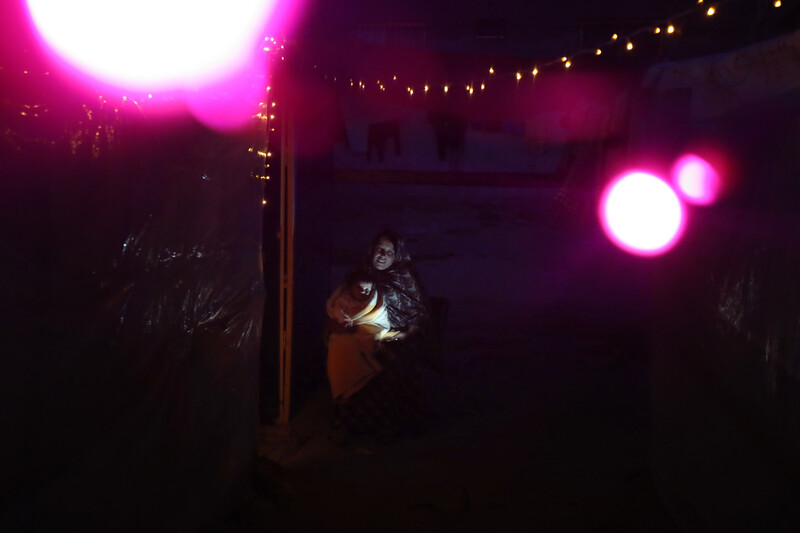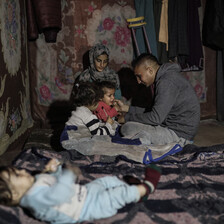The Electronic Intifada 22 March 2024

A huge number of Gaza’s women have to spend Ramadan in tents. (Omar Ashtawy / APA Images)
Amani, 31, has taken shelter along with her elderly mother at Rafah’s Al-Awda Hospital since October, when Israeli airstrikes forced them to leave their home at the Jabaliya refugee camp in northern Gaza.
The hospital is overcrowded with hundreds if not more displaced people, and it is difficult to maintain one’s personal hygiene given the limited access to bathrooms.
This is why Amani dreads her monthly menstruation.
On any given day, Amani is able to access the bathroom twice. The crowds are simply too large to use it more frequently.
“I feel disgusted when I change [my menstrual pad] only twice a day,” she said. “I used to change it five times a day, if not more.”
Amani must conserve her menstrual pads, as they are no longer readily available. She changes them only when absolutely necessary.
In addition, she experiences intense menstrual cramps and, without access to painkillers, she finds the cramps debilitating.
All of this makes Amani consider her period a kind of “hell” in an already hellish situation.
Risk of infection
Nour, 19, is living with her eight-member family at a relative’s home in Jabaliya camp.
Since the start of the war, Nour hasn’t had access to menstrual pads.
She now makes pads out of whatever kinds of scraps she can find: unused cloth, mattresses and rags. She washes and re-washes these pads to use throughout her cycle.
She once got a urinary tract infection that was so dire she had to go to the hospital. The doctor said that the infection was a result of numerous factors, including lack of access to water and basic tools of hygiene.
A severe urinary tract infection can lead to kidney failure, the doctor warned.
However, Nour has had to keep on using possibly unhygienic scraps during her period.
“If period products are even available, the quality is exceptionally poor and they are sold at such unaffordably high prices,” she said.
When it’s a choice between food or menstrual pads, food wins.
Nour’s father works for the Palestinian Authority, but he has received only a fraction of his salary since the beginning of the war.
The family is crammed into a relative’s home with over 70 other people. There is little privacy, and the two bathrooms (one for men, the other for women) are always busy.
Nour said she waits one to two hours to use the bathroom. During menstruation, that wait is even more uncomfortable than usual.
Even when the bathroom is unoccupied, there is no guarantee that there will be water. The families rely on refillable tanks for water since Israel has destroyed Gaza’s water infrastructure.
Nour must then go to a nearby school or hospital to use the bathroom. She said she feels uncomfortable using public toilets and that she has been sexually harassed there.
“My period has become a nightmare to me,” she said.
The discomfort is both physical and mental. To not be able to clean yourself is mentally distressing, and Nour said she believes it has in part led to mental deterioration.
Period delayed
Yasmin, 24, was forcibly displaced from her home in the Nuseirat refugee camp, central Gaza, in January.
In the first month of the war, Yasmin got her period twice in a month and each lasted for nine days. She believes this irregularity was caused by the stress of daily life.
Since the third month of the war, Yasmin has been taking norethisterone pills – ordinarily prescribed as birth control – to delay the onset of her period. It is too difficult to find menstrual pads, and when they can be found they are low-quality and too expensive.
According to Bilal Sulaiman, a doctor volunteering at al-Helal al-Emirati maternity hospital in Rafah, women experience psychological and physical symptoms during their periods due to hormonal changes. Abnormally high levels of stress can impact the duration of a period and can also cause increased cramps and other side effects, including nausea.
These impacts are compounded by the stress of not having ready access to a bathroom and running water. Yasmin lives in a house with 60 women and children and goes for many days without showering.
The norethisterone pills have provided some temporary relief for Yasmin, as she hasn’t had a period since she started taking them.
“I won’t stop it until the war ends, as long as there are no pads and no water to be used,” she said.
Khuloud Rabah Sulaiman is a journalist living in Gaza.





